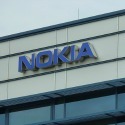
Rajeev Suri has quit as Nokia's CEO after a series of disappointments that included 5G product difficulties and an apparent setback in China. He will be succeeded later this year by Pekka Lundmark, the current president and CEO of Finnish energy company Fortum, the company announced in a statement today.
The news follows reports that Nokia was considering various strategic options including a possible sale of assets or merger, though that speculation has been dismissed this morning by the company's chairman Risto Siilasmaa during a press conference about Suri's departure. Its share price has lost more than a third of its value in the last year and fell 5.5% in Helsinki on Friday, to close at €3.45 ($3.83).
Figure 1:  Pekka Lundmark will take on the Nokia CEO role from September.
Pekka Lundmark will take on the Nokia CEO role from September.
Investors who feel the shake-up is already long overdue may be disappointed it is not happening sooner: Suri will not leave his role until August 31, according to Nokia's statement, and he is set to remain as a strategic advisor to the Nokia board until January 2021.
He will forever be remembered as the man who led Nokia to a €15.6 billion ($17.3 billion) takeover of rival Alcatel-Lucent. That mega deal established Nokia as one of the world's three largest network equipment vendors, alongside China's Huawei and Sweden's Ericsson, and took it into the markets for optical/IP transport and fixed broadband network products after it had previously concentrated on the mobile sector.
Figure 2:  Rajeev Suri is stepping down as Nokia's president and CEO.
Rajeev Suri is stepping down as Nokia's president and CEO.
Suri has repeatedly justified the deal on the grounds that Nokia needed an "end-to-end" product portfolio to satisfy customers' diverse network needs, but the takeover has brought little obvious success for Nokia.
The company made a net profit of just €18 million ($20 million) on sales of €23.3 billion ($25.8 billion) in its most recent fiscal year and has been forced to cut dividends while it bolsters cash reserves and pumps R&D funds into its ailing 5G business. Nokia's share price has more than halved since the Alcatel-Lucent takeover was first announced in 2015.
Far from giving Nokia an advantage in the all-important 5G market, that deal was partly blamed by executives for product-related problems the firm is now racing to fix. Among other things, Nokia is trying to phase out some expensive 5G components that are chewing into margins and threaten its ability to compete.
Another concern for investors is the company's position in China, which is due to hand out major 5G contracts in the coming weeks. Last July, Kristian Pullola, Nokia's chief financial officer, said there were signs of "growing support" for local vendors in China, and since then Nokia has reported metrics that suggest it has recently lost some market share in the country.
One industry analyst who previously spoke with Light Reading on condition of anonymity said Nokia has looked vulnerable in China as a result of the Alcatel-Lucent deal, which would have increased the market share of a Western firm to a level that made Chinese authorities uncomfortable.
Want to know more about 5G? Check out our dedicated 5G content channel here on Light Reading.
Not all of the news has been gloomy under Suri, however. A push into the enterprise sector has met with considerable success, with that new-look division reporting a 19% increase in revenues last year, on a constant-currency basis, to more than €1.4 billion ($1.6 billion).
Some of the Alcatel-Lucent businesses that Nokia acquired have also continued to perform well. Optical networks reported a 6% organic increase in sales last year, while IP routing grew by 11%.
But with those businesses and the fixed access unit together accounting for slightly more than one third of total network sales, they are not the main issue for shareholders, and Suri's forecasts that 5G growth is right around the corner have previously turned out to be wrong.
Lundmark will be under immediate pressure to show Nokia can be a stronger 5G force in future. "I am confident that the company is well positioned for the 5G era and it is my goal to ensure that we meet our commitments to our customers, employees, shareholders and other stakeholders," said Lundmark in his statement.
— Iain Morris, International Editor, Light Reading
About the Author(s)
You May Also Like




_International_Software_Products.jpeg?width=300&auto=webp&quality=80&disable=upscale)







